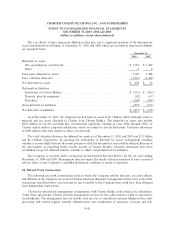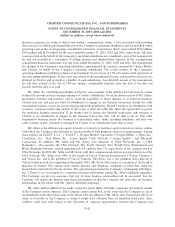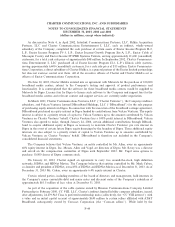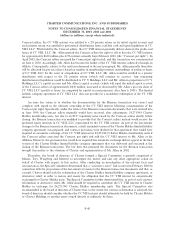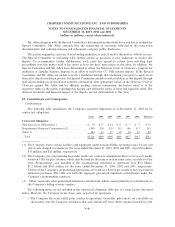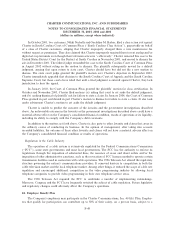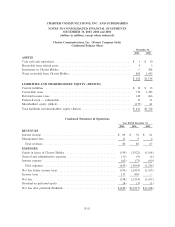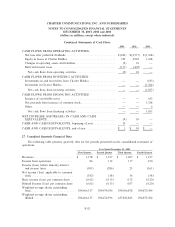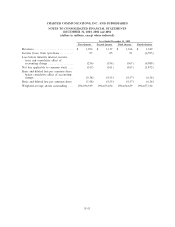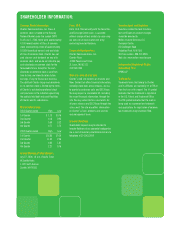Charter 2003 Annual Report Download - page 147
Download and view the complete annual report
Please find page 147 of the 2003 Charter annual report below. You can navigate through the pages in the report by either clicking on the pages listed below, or by using the keyword search tool below to find specific information within the annual report.CHARTER COMMUNICATIONS, INC. AND SUBSIDIARIES
NOTES TO CONSOLIDATED FINANCIAL STATEMENTS
DECEMBER 31, 2003, 2002 and 2001
(dollars in millions, except where indicated)
In October 2001, two customers, Nikki Nicholls and Geraldine M. Barber, Ñled a class action suit against
Charter in South Carolina Court of Common Pleas (""South Carolina Class Action''), purportedly on behalf
of a class of Charter customers, alleging that Charter improperly charged them a wire maintenance fee
without request or permission. They also claimed that Charter improperly required them to rent analog and/or
digital set-top terminals even though their television sets were ""cable ready.'' Charter removed this case to the
United States District Court for the District of South Carolina in November 2001, and moved to dismiss the
suit in December 2001. The federal judge remanded the case to the South Carolina Court of Common Pleas
in August 2002 without ruling on the motion to dismiss. The plaintiÅs subsequently moved for a default
judgment, arguing that upon return to state court, Charter should have but did not Ñle a new motion to
dismiss. The state court judge granted the plaintiÅ's motion over Charter's objection in September 2002.
Charter immediately appealed that decision to the South Carolina Court of Appeals and the South Carolina
Supreme Court, but those courts have ruled that until a Ñnal judgment is entered against Charter, they lack
jurisdiction to hear the appeal.
In January 2003, the Court of Common Pleas granted the plaintiÅs' motion for class certiÑcation. In
October and November 2003, Charter Ñled motions (a) asking that court to set aside the default judgment,
and (b) seeking dismissal of plaintiÅs' suit for failure to state a claim. In January 2004, the Court of Common
Pleas granted in part and denied in part Charter's motion to dismiss for failure to state a claim. It also took
under advisement Charter's motion to set aside the default judgment.
Charter is unable to predict the outcome of the lawsuits and the government investigations described
above. An unfavorable outcome in the lawsuits or the government investigations described above could have a
material adverse eÅect on the Company's consolidated Ñnancial condition, results of operations or its liquidity,
including its ability to comply with the Company's debt covenants.
In addition to the matters set forth above, Charter is also party to other lawsuits and claims that arose in
the ordinary course of conducting its business. In the opinion of management, after taking into account
recorded liabilities, the outcome of these other lawsuits and claims will not have a material adverse eÅect on
the Company's consolidated Ñnancial condition or results of operations.
Regulation in the Cable Industry
The operation of a cable system is extensively regulated by the Federal Communications Commission
(""FCC''), some state governments and most local governments. The FCC has the authority to enforce its
regulations through the imposition of substantial Ñnes, the issuance of cease and desist orders and/or the
imposition of other administrative sanctions, such as the revocation of FCC licenses needed to operate certain
transmission facilities used in connection with cable operations. The 1996 Telecom Act altered the regulatory
structure governing the nation's communications providers. It removed barriers to competition in both the
cable television market and the local telephone market. Among other things, it reduced the scope of cable rate
regulation and encouraged additional competition in the video programming industry by allowing local
telephone companies to provide video programming in their own telephone service areas.
The 1996 Telecom Act required the FCC to undertake a number of implementing rulemakings.
Moreover, Congress and the FCC have frequently revisited the subject of cable regulation. Future legislative
and regulatory changes could adversely aÅect the Company's operations.
24. Employee BeneÑt Plan
The Company's employees may participate in the Charter Communications, Inc. 401(k) Plan. Employ-
ees that qualify for participation can contribute up to 50% of their salary, on a pre-tax basis, subject to a
F-49




